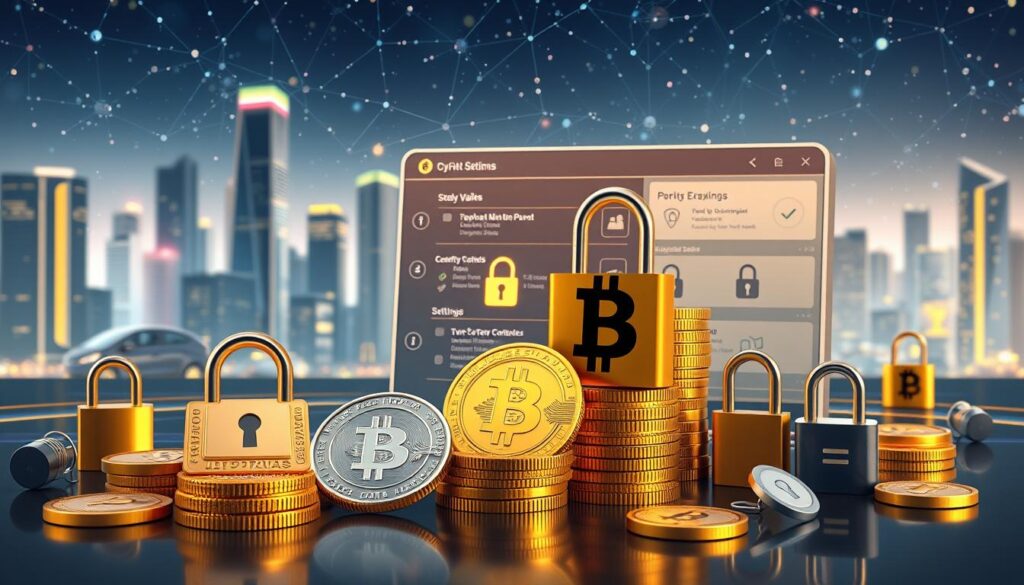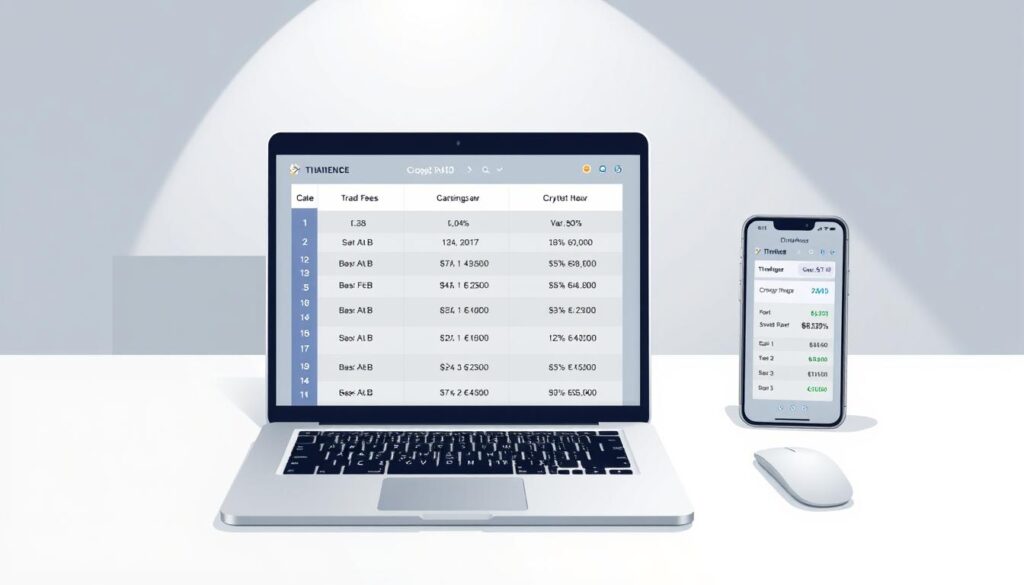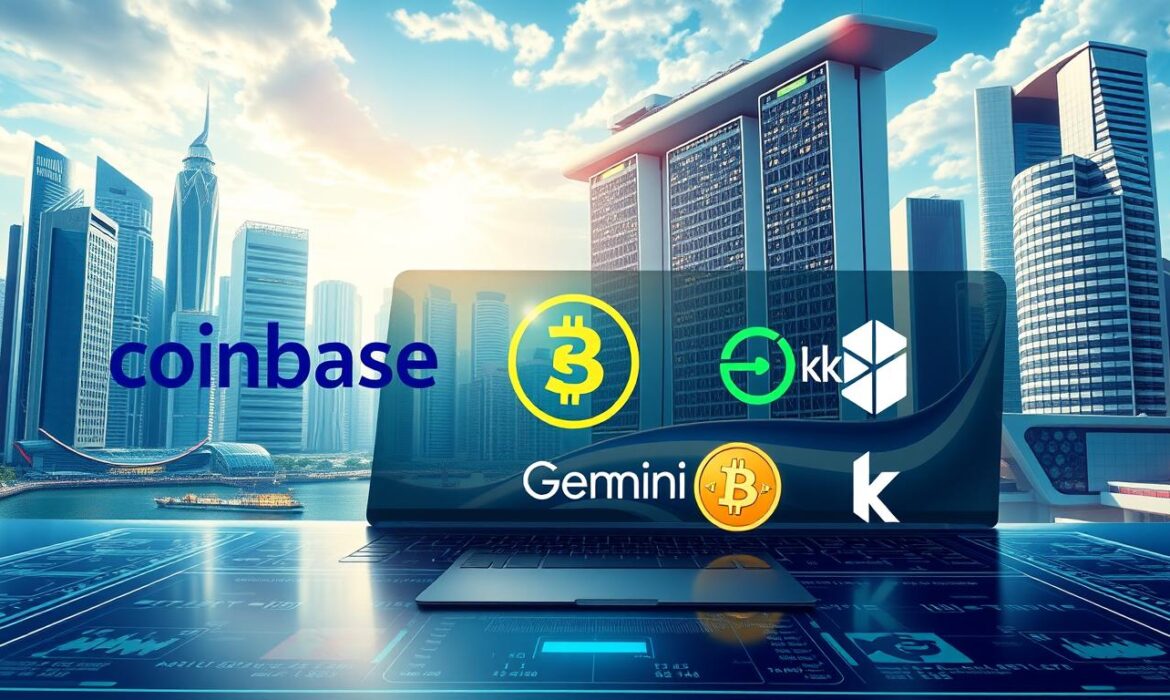Singapore has emerged as a leading hub for digital assets in Asia. With its robust regulatory frameworks and government support, the city-state attracts both retail and institutional investors. The Monetary Authority of Singapore (MAS) has licensed 33 Digital Payment Token (DPT) providers, ensuring a secure environment for users.
However, the growing adoption of digital assets comes with risks. In 2024, over S$230 million was lost to crypto scams, highlighting the need for caution. Choosing a platform regulated by MAS is crucial for safeguarding your investments.
When selecting a platform, consider factors like security, fees, supported coins, and user experience. These elements ensure a seamless and protected trading journey. Singapore’s commitment to innovation and safety makes it an ideal destination for crypto enthusiasts.
Key Takeaways
- Singapore is a leading crypto hub in Asia with strong regulations.
- MAS has licensed 33 DPT providers for secure trading.
- Over S$230 million was lost to crypto scams in 2024.
- Always choose MAS-regulated platforms for safety.
- Key selection criteria include security, fees, and user experience.
Introduction to Cryptocurrency in Singapore
Singapore’s regulatory framework sets it apart in the crypto industry. The city-state has embraced digital assets with a balanced approach, combining innovation with stringent oversight. This makes it a preferred destination for investors and businesses alike.
Singapore’s Role as a Crypto Hub
Under the Monetary Authority of Singapore (MAS), the country has established a progressive regulatory environment. The Payment Services Act (PSA) requires all Digital Payment Token (DPT) service providers to obtain a license. Regular audits ensure compliance, fostering trust among users.
Compared to other Asian markets, Singapore’s framework is more comprehensive. It emphasizes anti-money laundering (AML) measures and safeguards user funds. This proactive stance has positioned the city-state as a leader in the region.
Why Choose a Regulated Exchange?
Opting for a licensed platform offers several advantages. MAS-regulated exchanges adhere to strict security protocols, reducing the risk of fraud. They also ensure AML compliance, protecting users from illicit activities.
In contrast, unregulated platforms pose significant risks. In 2024, over S$230 million was lost to scams, highlighting the dangers of trading on unlicensed sites. Additionally, banks in Singapore have restricted peer-to-peer (P2P) transactions to enhance security.
Choosing a regulated exchange not only safeguards your investments but also ensures a seamless payment experience. With MAS oversight, users can trade with confidence, knowing their assets are protected.
Why Trade with Licensed Cryptocurrency Exchanges in Singapore
Licensed platforms offer unmatched safety for digital asset trading. The Monetary Authority of Singapore (MAS) ensures that all providers meet strict regulatory standards. This creates a secure environment for users to trade with confidence.
Regulatory Framework by MAS
MAS requires all Digital Payment Token (DPT) service providers to obtain a license under the Payment Services Act (PSA). This process involves rigorous compliance checks, including anti-money laundering (AML) measures and regular audits. Providers must also maintain 1:1 customer fund reserves, ensuring that user assets are always protected.
Cold storage mandates further enhance security. Customer assets are stored offline, reducing the risk of hacking. Additionally, MAS-regulated platforms must have mandatory cyber risk insurance coverage. This provides an extra layer of protection against potential breaches.
Benefits of MAS-Regulated Exchanges
Real-time transaction monitoring systems are a key feature of licensed platforms. These systems detect suspicious activities instantly, safeguarding users from fraud. Institutional-grade custody solutions also ensure that assets are managed with the highest level of care.
Compared to offshore exchanges, MAS-regulated platforms offer superior consumer protections. Users can trade with peace of mind, knowing their funds are secure. As one expert noted,
“Regulated platforms provide a level of trust that unlicensed providers simply cannot match.”
Choosing a licensed provider not only minimizes risk but also ensures a seamless trading experience. With MAS oversight, users can focus on their investments without worrying about security or compliance issues.
Top MAS-Regulated Cryptocurrency Exchanges in Singapore
With a focus on security and innovation, Singapore hosts some of the most trusted platforms for digital asset trading. These platforms are regulated by the Monetary Authority of Singapore (MAS), ensuring a safe and reliable environment for users. Below, we explore the key features of eight leading options.
Coinhako
Coinhako is a popular choice for its user-friendly interface and extensive coin selection. It supports over 130 digital assets and integrates PayNow for seamless SGD deposits. With a trading fee of 0.6%, it offers a balanced option for both beginners and experienced traders.
Independent Reserve
Known for its low withdrawal fee of S$1.5, Independent Reserve is a reliable platform for long-term investors. It provides a secure environment with institutional-grade custody solutions, making it a trusted choice for safeguarding assets.
Crypto.com
Crypto.com stands out with its unique features, including a Visa card that allows users to spend their digital assets. It also offers competitive trading fees and a wide range of supported coins, catering to diverse trading needs.
Coinbase
Coinbase is renowned for its robust security measures and user-friendly design. It supports a variety of payment methods and provides educational resources, making it an excellent choice for newcomers to the digital asset space.
Upbit
Upbit offers a comprehensive trading experience with a focus on security and transparency. It supports multiple payment methods and provides real-time transaction monitoring, ensuring a safe environment for users.
OKX
OKX is a top choice for derivatives trading, offering a fee of just 0.1%. It also supports PayNow for SGD deposits, making it a convenient option for Singaporean traders. With its advanced trading tools, it caters to both retail and institutional investors.
Gemini
Gemini is known for its institutional-grade security certifications and compliance with regulatory standards. It offers a secure platform for trading a variety of digital assets, making it a trusted choice for serious investors.
Bitrue
Bitrue boasts an impressive selection of over 700 altcoins, making it a go-to platform for traders seeking diversity. It also offers competitive fees and a user-friendly interface, ensuring a seamless trading experience.
| Platform | Trading Fees | Supported Coins | Payment Methods |
|---|---|---|---|
| Coinhako | 0.6% | 130+ | PayNow, Bank Transfer |
| Independent Reserve | 0.5% | 20+ | Bank Transfer |
| Crypto.com | 0.4% | 250+ | Credit Card, Bank Transfer |
| Coinbase | 0.5% | 100+ | Credit Card, Bank Transfer |
| Upbit | 0.25% | 200+ | Bank Transfer |
| OKX | 0.1% | 300+ | PayNow, Bank Transfer |
| Gemini | 0.35% | 50+ | Bank Transfer |
| Bitrue | 0.2% | 700+ | Bank Transfer |
MAS-Regulated Non-Exchange Platforms for Buying Crypto
For those seeking alternatives to traditional exchanges, MAS-regulated non-exchange platforms provide unique opportunities. These platforms, often backed by banks, combine the familiarity of traditional finance with the innovation of digital assets. They are ideal for investors who prefer a more structured approach to their investment journey.

Bank-backed platforms appeal to traditional investors by offering seamless integration with existing accounts. They also provide tools like tax reporting, making it easier to manage digital assets alongside other investments. However, it’s essential to understand their limitations and fees before diving in.
Revolut
Revolut, a UK-based digital bank, offers access to over 130 digital assets. It charges a 1.49% fee for transactions but blocks external transfers, meaning users cannot move their assets to other wallets. This limitation makes it more suitable for casual investors rather than active traders.
While Revolut’s user-friendly interface is a plus, it’s important to note the hidden costs. The platform adds a spread markup, which can increase the overall cost of transactions. Despite this, its integration with debit cards and PayNow makes it a convenient option for SGD transactions.
Moomoo
Moomoo, known for its stock and ETF trading, supports a limited selection of six digital assets. It’s a great choice for investors who want to diversify their portfolio without venturing too far from traditional investments. The platform is operational in multiple countries, including Singapore, and has received in-principle approval from MAS.
Compared to Revolut, Moomoo’s asset selection is narrower, but its focus on traditional markets appeals to conservative investors. Its straightforward interface and integration with bank accounts make it easy to use for beginners.
DBS Digital Exchange (DDEx)
DBS Digital Exchange (DDEx) caters exclusively to accredited and institutional investors. Backed by DBS Bank, it offers a secure environment for trading digital assets like security tokens and crypto. However, its eligibility requirements limit access to a select group of users.
DDEx’s institutional focus ensures high security and compliance standards. It’s an excellent choice for professional investors looking for a trusted platform with robust regulatory oversight. As one expert noted,
“DDEx bridges the gap between traditional finance and digital assets, offering a secure gateway for institutional players.”
| Platform | Supported Assets | Fees | Key Features |
|---|---|---|---|
| Revolut | 130+ | 1.49% | Debit card integration, PayNow |
| Moomoo | 6 | Varies | Stock and ETF trading, MAS-approved |
| DDEx | Multiple | Varies | Institutional focus, DBS-backed |
When choosing a non-exchange platform, consider your investment goals and trading preferences. While these platforms offer convenience and security, they may not provide the same flexibility as dedicated exchanges. For a comprehensive list of MAS-regulated providers, visit this resource.
Fees Structure of Cryptocurrency Exchanges
Understanding the fee structure of digital asset platforms is essential for making informed decisions. Fees can vary widely depending on the platform, payment method, and type of transaction. Knowing what to expect can help you save money and avoid surprises.
Trading Fees
Most platforms use a maker-taker fee model. Makers add liquidity to the market by placing limit orders, while takers remove liquidity by executing market orders. For example, platforms like OKX charge as low as 0.1% for takers, while Coinhako charges 0.6%.
Using limit orders can reduce costs, as they often qualify for lower maker fees. Additionally, trading SGD pairs can help avoid currency conversion charges.
Deposit and Withdrawal Fees
Deposit methods can significantly impact costs. FAST transfers are usually free, but credit card deposits can cost 3-4%. For example, Coinbase charges a 3.49% fee for card deposits.
Withdrawal fees also vary. Independent Reserve charges S$1.5 per withdrawal, while some platforms impose higher fees for smaller amounts. Always check the fee structure before initiating a transaction.
Stablecoin Conversion Fees
Converting stablecoins can incur additional costs. Coinbase, for instance, charges 0.20% for stablecoin conversions. Some platforms also add hidden fees, like Gemini’s 1.49% transaction fee plus a 1% convenience fee.
Gas fees on ERC-20 networks can also fluctuate, especially during high traffic. Planning transactions during off-peak hours can help minimize these costs.
“Hidden fees can quickly add up, so always read the fine print before committing to a platform.”
- Use limit orders to qualify for lower maker fees.
- Opt for FAST transfers to avoid deposit charges.
- Be aware of inactivity fees on smaller platforms.
- Monitor gas fees on ERC-20 networks to save on transactions.
Spot Trading vs. Derivatives Trading
Spot and derivatives trading are two popular methods for engaging with digital assets. Each approach has its own advantages and risks, making it essential to understand their differences before diving in.
What is Spot Trading?
Spot trading involves buying and selling assets for immediate delivery. When you purchase a digital asset through spot trading, you own it outright. This method is straightforward and ideal for long-term investors who prefer holding assets rather than speculating on price movements.
For example, if you buy Bitcoin through spot trading, you own the Bitcoin directly. This ownership allows you to transfer, store, or use the asset as you see fit. Spot trading is often recommended for those adopting a HODL (Hold On for Dear Life) strategy.
What is Derivatives Trading?
Derivatives trading, on the other hand, involves contracts based on the future price of an asset. Instead of owning the asset, you speculate on its price movement. Common derivatives include futures, options, and perpetual contracts.
One key feature of derivatives trading is leverage, which allows you to amplify your gains—or losses. For instance, during the 2022 Bitcoin crash, many traders faced significant losses due to high leverage. This highlights the risk associated with derivatives trading.
“Leverage can be a double-edged sword, offering the potential for high rewards but also exposing traders to substantial risks.”
Platforms like OKX, Gemini, and Bitrue offer derivatives trading, catering to both retail and institutional investors. However, the Monetary Authority of Singapore (MAS) imposes position limits on retail derivatives to protect traders from excessive risk.
Key Differences and Considerations
- Ownership: Spot trading grants direct ownership, while derivatives trading involves contracts.
- Risk: Derivatives trading carries higher risk due to leverage and market volatility.
- Tax Implications: Spot trading may have different tax treatments compared to derivatives trading.
- Long-Term Strategies: Spot trading is better suited for long-term holding, while derivatives are ideal for short-term speculation.
Understanding these differences can help you choose the right approach based on your goals and risk tolerance. Whether you prefer the simplicity of spot trading or the complexity of derivatives, always trade responsibly.
Types of Cryptocurrencies Available in Singapore
Investors in Singapore have access to over 10,000 digital assets across various categories. These assets serve different purposes, from facilitating payments to enabling decentralized finance (DeFi) and powering the metaverse. Understanding these categories can help you make informed decisions in the market.
Payment and Store-of-Value Cryptocurrencies
Bitcoin (BTC) is the most well-known example in this category. It’s designed as a decentralized currency for peer-to-peer transactions. Other assets like Litecoin (LTC) also fall into this group. These coins are often used for long-term investment due to their stability and widespread acceptance.
Infrastructure Cryptocurrencies
Ethereum (ETH) leads this category, enabling smart contracts and decentralized applications. Its blockchain supports a wide range of use cases, from DeFi to NFTs. Other infrastructure-focused assets include Polkadot (DOT) and Solana (SOL), which aim to improve scalability and interoperability.
Financial Cryptocurrencies
Stablecoins like USDT and USDC play a crucial role in trading pairs. They are pegged to fiat currencies, reducing volatility. Real-world asset (RWA) tokens, which represent physical assets like gold or real estate, are also gaining traction in Singapore’s market.
Service Cryptocurrencies
These assets power specific services or platforms. For example, Chainlink (LINK) provides decentralized oracle services, while Filecoin (FIL) focuses on decentralized storage. They are essential for the functionality of many blockchain-based applications.
Media and Entertainment Cryptocurrencies
Tokens like Decentraland (MANA) and The Sandbox (SAND) are used in virtual worlds and gaming platforms. They enable users to buy, sell, and trade virtual assets. However, memecoins like Dogecoin (DOGE) are highly volatile and should be approached with caution.
- Stablecoins are widely used for trading pairs due to their low volatility.
- Singapore restricts privacy coins like Monero (XMR) to comply with regulatory standards.
- Trending categories include RWA tokens and liquid staking assets.
- Platforms vary in their altcoin availability, so check before investing.
- Memecoins can be highly volatile, as seen with Dogecoin’s price swings.
Whether you’re looking for a store of value or exploring the metaverse, Singapore’s crypto landscape offers something for everyone. Always research and choose assets that align with your goals and risk tolerance.
Difference Between Bitcoin, Altcoin, Memecoin, and Stablecoin
Understanding the differences between Bitcoin, altcoins, memecoins, and stablecoins is crucial for investors. Each category serves a unique purpose in the crypto ecosystem, offering distinct features and risk profiles. Let’s explore these digital assets in detail.

Bitcoin
Bitcoin (BTC) is the pioneer of the cryptocurrency world. Its first-mover advantage and capped supply of 21 million coins make it a store of value. Unlike other assets, Bitcoin’s scarcity drives its price and appeal among long-term investors.
Its decentralized nature ensures security and transparency. As one expert noted,
“Bitcoin’s limited supply and global acceptance make it the gold standard of digital assets.”
Altcoins
Altcoins, or alternative coins, include all digital assets other than Bitcoin. Ethereum is a prominent example, known for its smart contract capabilities. These coins often aim to improve upon Bitcoin’s limitations, offering faster transactions or enhanced functionality.
For instance, Ethereum enables decentralized applications (dApps) and NFTs, making it a cornerstone of the blockchain ecosystem. However, altcoins can be more volatile due to their smaller market caps.
Memecoins
Memecoins are community-driven assets, often created as jokes or tributes. Dogecoin and Shiba Inu are popular examples. While they lack utility, their price movements are fueled by social media trends and celebrity endorsements.
Investing in memecoins carries high risk, as their value is highly speculative. As one trader warned,
“Memecoins can skyrocket overnight, but they can also crash just as quickly.”
Stablecoins
Stablecoins are designed to minimize volatility by pegging their value to fiat currencies like the USD. They come in two types: collateralized (backed by reserves) and algorithmic (controlled by smart contracts).
These coins are widely used for trading pairs and as a hedge against market fluctuations. For example, USDT and USDC are popular choices for investors seeking stability in a volatile crypto market.
- Bitcoin’s scarcity makes it a long-term store of value.
- Altcoins like Ethereum offer advanced functionalities.
- Memecoins are highly speculative and community-driven.
- Stablecoins provide stability in a volatile market.
Understanding these categories helps investors make informed decisions based on their goals and risk tolerance. Whether you’re drawn to Bitcoin’s scarcity or the innovation of altcoins, always research thoroughly before investing.
Is Cryptocurrency a Good Investment for You?
Deciding whether to invest in digital assets requires careful consideration of your financial goals and risk tolerance. While the potential for high returns is enticing, it’s essential to understand the unique challenges and uncertainties of the market.
Understanding the Risks
Digital assets are highly volatile, and their value can fluctuate dramatically within short periods. Unlike traditional investments, they are not backed by physical assets or government guarantees. The Monetary Authority of Singapore (MAS) does not recognize crypto as legal tender, and there is no deposit insurance to protect your funds.
Before investing, ask yourself these three questions:
- Can I afford to lose the money I’m investing?
- Do I understand how the market works?
- Am I prepared for the emotional stress of price swings?
Assessing Your Financial Stability
Investing in digital assets should only be done with disposable income. Experts recommend allocating no more than 1-5% of your portfolio to crypto. This ensures that your overall financial stability remains intact, even if the market takes a downturn.
Here’s a simple portfolio allocation strategy:
| Asset Type | Allocation (%) |
|---|---|
| Stocks | 60 |
| Bonds | 30 |
| Digital Assets | 5 |
| Cash | 5 |
Tax implications also vary between traders and holders. Traders may face capital gains tax, while long-term holders might benefit from lower rates. Always consult a tax professional to understand your obligations.
Dollar-cost averaging is a smart approach for beginners. By investing a fixed amount regularly, you reduce the impact of market volatility. However, never use emergency funds or take on debt to invest in digital assets.
“Investing in digital assets can be rewarding, but it’s crucial to approach it with caution and a clear strategy.”
Safety Tips for Trading Cryptocurrency in Singapore
Ensuring the safety of your digital assets is a top priority for any investor. With the rise of digital transactions, adopting robust security measures is essential. This section provides practical tips to protect your investments and trade with confidence.

Using MAS-Regulated Platforms
Choosing a platform regulated by the Monetary Authority of Singapore (MAS) is the first step toward secure trading. These platforms adhere to strict guidelines, including anti-money laundering (AML) protocols and regular audits. This ensures your funds are protected from fraud and mismanagement.
MAS-regulated providers also maintain 1:1 customer fund reserves and use cold storage for asset protection. These measures minimize the risk of hacking and ensure your assets are always accessible. Always verify the license status of a platform before signing up.
Securing Your Crypto Holdings
Beyond choosing a reliable platform, safeguarding your assets requires proactive steps. Here are some key practices:
- Hot vs. Cold Wallets: Hot wallets are convenient for frequent transactions, but cold wallets (hardware wallets) offer superior security for long-term storage.
- Two-Factor Authentication (2FA): Use an authenticator app instead of SMS for 2FA, as it’s less vulnerable to phishing attacks.
- Phishing Prevention: Avoid clicking on suspicious links or sharing sensitive information. Always double-check URLs and email senders.
- Inheritance Planning: Ensure your loved ones can access your assets by securely storing wallet recovery phrases and legal instructions.
- Private Keys: Never share your private keys with anyone. They are the gateway to your funds.
Here’s a comparison of wallet types to help you decide:
| Wallet Type | Security Level | Best Use Case |
|---|---|---|
| Hot Wallet | Moderate | Frequent transactions |
| Cold Wallet | High | Long-term storage |
By following these tips, you can significantly reduce the risk of losing your assets. Remember, security is an ongoing process, not a one-time setup. Stay vigilant and update your practices as new threats emerge.
How to Choose the Best Crypto Exchange in Singapore
Selecting the right platform for digital asset trading involves evaluating multiple factors to ensure a secure and efficient experience. From robust security measures to user-friendly interfaces, each aspect plays a crucial role in your trading journey. Here’s a detailed guide to help you make an informed choice.
Security Measures
Security is paramount when choosing a platform. Look for features like SOC 2 compliance, which ensures the platform meets stringent data protection standards. Additionally, platforms with insurance coverage provide an extra layer of protection for your assets.
Cold storage is another critical feature. It keeps the majority of funds offline, reducing the risk of hacking. Two-factor authentication (2FA) and regular security audits further enhance the safety of your account.
Supported Cryptocurrencies
The variety of supported coins is a key consideration. Top platforms offer over 200 digital assets, catering to diverse trading needs. Whether you’re interested in Bitcoin, Ethereum, or emerging altcoins, ensure the platform supports your preferred assets.
For advanced traders, API access is essential. It allows for automated trading and integration with third-party tools, enhancing your trading strategy.
User Experience
A seamless user experience can make a significant difference. Compare mobile app ratings across platforms to gauge their usability. High ratings often indicate intuitive design and reliable performance.
Customer support is another critical factor. Platforms offering 24/7 support through multiple channels, such as live chat and email, ensure you can resolve issues quickly. Additionally, evaluate the speed and simplicity of the KYC process, as delays can hinder your trading activities.
“A user-friendly interface and responsive customer support are essential for a stress-free trading experience.”
| Platform | Mobile App Rating | Customer Support Channels | KYC Speed |
|---|---|---|---|
| Coinhako | 4.5/5 | Live Chat, Email | 24 hours |
| Crypto.com | 4.7/5 | Live Chat, Phone | 12 hours |
| Coinbase | 4.6/5 | Email, Help Center | 48 hours |
By considering these factors, you can choose a platform that aligns with your needs and ensures a secure, efficient trading experience. Always prioritize platforms that offer comprehensive security, diverse asset support, and excellent user experience.
Comparing Trading Fees Across Exchanges
Understanding the cost structure of trading platforms is essential for maximizing your investment returns. Fees can vary significantly between platforms, impacting your overall profitability. This section breaks down the key aspects of trading fees to help you make informed decisions.

Lowest Trading Fees
When it comes to minimizing costs, some platforms stand out. For example, OKX offers a low taker fee of just 0.1%, making it an attractive option for active traders. In contrast, platforms like Gemini charge a higher fee of 1.49%, which can add up over time.
Here’s a quick comparison of popular platforms:
- OKX: 0.1% taker fee
- Coinhako: 0.6% trading fee
- Gemini: 1.49% transaction fee
Volume-based discounts are another factor to consider. Some platforms reduce fees for high-volume traders, offering significant savings for those who trade frequently.
Hidden Fees to Watch Out For
While advertised fees are important, hidden costs can also impact your bottom line. Spread costs in instant buys, for example, can be higher than expected. Foreign exchange markups are another common issue, especially when trading in SGD.
Here are some hidden fees to be aware of:
- Inactivity Fees: Some platforms charge fees if your account remains inactive for a certain period.
- Withdrawal Minimums: Platforms may impose minimum withdrawal amounts, which can be inconvenient for small traders.
- Spread Costs: The difference between the buy and sell price can add up, especially in volatile markets.
“Always read the fine print to avoid unexpected charges. Hidden fees can quickly erode your profits.”
By understanding these costs, you can choose a platform that aligns with your trading style and financial goals. Whether you’re a high-volume trader or a casual investor, being aware of fees ensures you get the most out of your investments.
User Reviews and Reputation Among Singaporean Traders
User feedback plays a crucial role in evaluating the reliability of trading platforms. In Singapore, local traders often share their experiences to help others make informed decisions. These reviews highlight both strengths and weaknesses, offering a balanced perspective on various platforms.
Top-Rated Exchanges by Users
Several platforms stand out based on positive reviews from Singaporean users. Coinhako, for instance, is praised for its FAST transfers, which allow seamless SGD deposits. Its user-friendly interface and extensive coin selection also make it a favorite among both beginners and experienced traders.
Another highly rated platform is Crypto.com, known for its competitive fees and innovative features like the Visa card. Users appreciate its responsive customer support and reliable app performance. Here’s a quick look at top-rated platforms:
- Coinhako: FAST transfers, user-friendly interface.
- Crypto.com: Competitive fees, Visa card integration.
- Coinbase: Robust security, educational resources.
Common Complaints and Issues
Despite their strengths, some platforms face recurring complaints. Withdrawal delays are a frequent issue, as reported in local forums. Users also express frustration over limited SGD pairing availability, which can increase transaction costs.
Another common concern is the KYC process. Delays in account verification can hinder trading activities, leading to dissatisfaction. Additionally, some users criticize the spread costs in instant buys, which are often higher than expected.
“Transparency in fees and faster KYC processing are key areas for improvement,” noted one user.
To address these issues, platforms are enhancing their dispute resolution processes. The Monetary Authority of Singapore (MAS) also monitors complaints to ensure platforms meet regulatory standards.
Conclusion: Finding the Best Cryptocurrency Exchange in Singapore
Choosing the right platform for digital asset trading requires careful evaluation of key factors. Start by ensuring the platform is licensed by the Monetary Authority of Singapore (MAS). This guarantees adherence to strict security and regulatory standards.
Consider fees, supported coins, and user experience when making your decision. For beginners, platforms like Coinhako offer a user-friendly interface and extensive coin selection. Advanced traders may prefer Crypto.com for its competitive fees and innovative features.
Ongoing security practices are essential. Use cold wallets for long-term storage and enable two-factor authentication (2FA) for added protection. Diversify your portfolio to minimize risks and maximize potential returns.
Stay updated on regulatory changes to ensure compliance and safeguard your investments. Here’s a quick checklist for comparison: MAS licensing, fee structure, supported assets, and customer support.
By following these guidelines, you can confidently navigate the world of digital asset trading and find the platform that best suits your needs.

